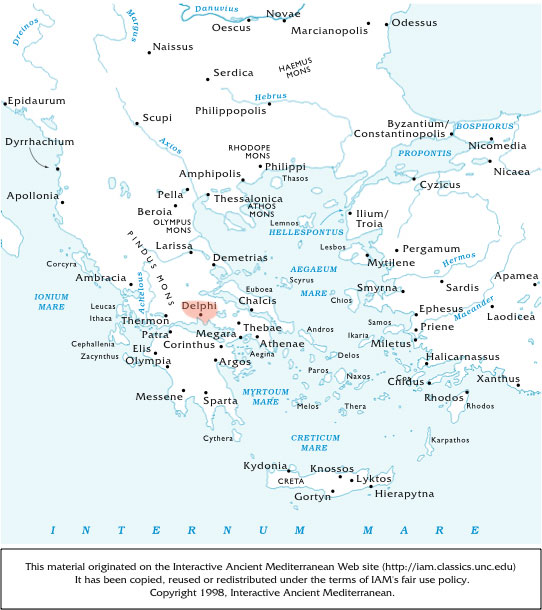A country in northern Greece, bounded on the north by the Locri Epicnemidii and Opuntii, on the east by Boeotia, on the west by the Locri Ozolae and Doris, and on the south by the Corinthian Gulf. At one time it possessed a narrow strip of country on the Euboean Sea, with the seaport Daphnus, between the territory of the Locri Epicnemidii and Locri Opuntii.It was a mountainous and unproductive country, and owes its chief importance in history to the fact of its possessing the Delphic oracle. Its chief mountain was Parnassus, situated in the interior of the country, to which, however, Cnemis, on its northern frontier, Cirphis, south of Delphi, and Helicon, on the southeastern frontier, all belonged.
The principal river in Phocis was the Cephisus, the valley of which contained almost the only fertile land in the country, with the exception of the celebrated Crissaean Plain in the southwest, on the borders of the Locri Ozolae. Among the earliest inhabitants of Phocis we find mentioned Leleges, Thracians, Abantes, and Hyantes. Subsequently, but still in the ante-historical period, the Phlegyae, an Achaean race, a branch of the Minyae at Orchomenos, took possession of the country; and from this time the main bulk of the population continued to be Achaean, although there were Dorian settlements at Delphi and Bulis. The Phocians are said to have derived their name from an eponymous ancestor Phocus (q.v.), and they are mentioned under this name in the Iliad.
The Phocians played no conspicuous part in Greek history till the time of Philip of Macedon; but at this period they became involved in a war, called the Phocian or Sacred War, in which the principal states of Greece took part. The Thebans had long been inveterate enemies of the Phocians; and as the latter people had cultivated a portion of the Crissaean Plain, which the Amphictyons had declared in B.C. 585 should lie waste forever, the Thebans availed themselves of this pretext to persuade the Amphictyons to impose a fine upon the Phocians, and upon their refusal to pay it, the Thebans further induced the council to declare the Phocian land forfeited to the god of Delphi. Thus threatened by the Amphictyonic Council, backed by the whole power of Thebes, the Phocians were persuaded by Philomelus, one of their citizens, to seize Delphi, and to make use of the treasures of the temple for the purpose of carrying on the war. They obtained possession of the temple in B.C. 357. The war which ensued lasted ten years, and was carried on with various success on each side. The Phocians were commanded first by Philomelus, B.C. 357-353, afterward by his brother Onomarchus, 353-352, then by Phayllus, the brother of the two preceding, 352-351, and finally by Phalaecus, the son of Onomarchus, 351-346. The Phocians received some support from Athens, but their chief dependence was upon their mercenary troops, which the treasures of the Delphic temple enabled them to hire. The Amphictyons and the Thebans, finding at length that they were unable with their own resources to subdue the Phocians, called in the assistance of Philip of Macedon, who brought the war to a close in 346. The conquerors inflicted the most signal punishment upon the Phocians, who were regarded as guilty of sacrilege. All their towns were razed to the ground with the exception of Abae, and the inhabitants distributed in villages containing no more than fifty inhabitants. The two votes which they had in the Amphictyonic Council were taken away and given to Philip. (Harpers Dictionary of Classical Antiquities, 1898)
